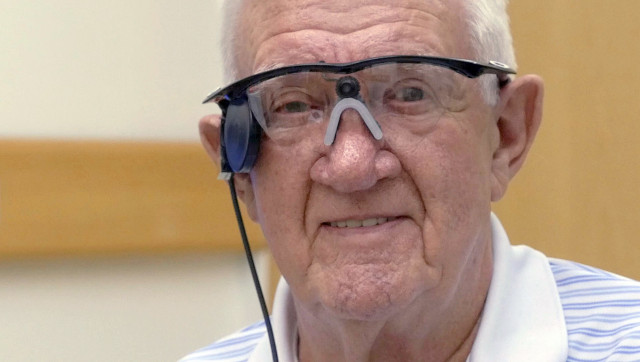Bionic eye helps UK pensioner see in world first
Partially sighted British pensioner has had most of his vision restored thanks to the device

This handout picture released by the Central Manchester University Hospitals NHS Foundation Trust press office on July 22, 2015, shows age-related macular degeneration (AMD) sufferer Ray Flynn, wearing a "bionic eye", at Manchester Royal Eye Hospital in Manchester, central England. PHOTO AFP
The University of Manchester announced the success of the operation on retired engineer Ray Flynn in a statement on Wednesday, saying it was a world first for the 80-year-old's particular condition.
Flynn has age-related macular degeneration (AMD), a condition which affects over 500,000 people in Britain and is the most common cause of blindness in people aged over 50 in developing countries.
Read: Improving healthcare: A new way to practice medicine in Pakistan
The condition means that his vision is impaired and he cannot see things directly in front of him. This prevents him from reading or driving and makes it difficult for him to recognise faces.
The statement said Flynn was now looking forward to watching his beloved Manchester United football team play and doing the gardening.
"Mr Flynn's progress is truly remarkable, he is seeing the outline of people and objects very effectively," said Professor Paulo Stanga, who led the four-hour operation.
"The dry form of AMD is a common, but untreatable condition. In the Western world, it is the leading cause of sight loss. Unfortunately, with an ageing population, it is becoming more common," he said.
The device was fitted in June and activated on July 1.
 Partially sighted British pensioner Flynn, who has age-related macular degeneration (AMD), a condition which affects over 500,000 people in Britain, has had most of his vision restored thanks to a "bionic eye" - a device that converts video images from a miniature camera installed in his glasses to his brain. PHOTO: AFP
Partially sighted British pensioner Flynn, who has age-related macular degeneration (AMD), a condition which affects over 500,000 people in Britain, has had most of his vision restored thanks to a "bionic eye" - a device that converts video images from a miniature camera installed in his glasses to his brain. PHOTO: AFPRetinal degenerative diseases like AMD affect more than 30 million people around the world, according to the US-based Foundation Fighting Blindness (FFB).
Read: Modern medicine: Deep Brain Stimulation offers Parkinson’s patients new hope
Bionic retinas are no longer restricted to the realm of science fiction and already help blind or partially blind people affected by other conditions.
The technology has already been used on dozens of people with retinitis pigmentosa (RP).
The technology turns images captured by the camera into small electrical pulses, which are transmitted wirelessly to electrodes on the retina surface.
The electrodes then stimulate the remaining cells and replicate patterns of light for the brain, which will eventually be interpreted fully by Flynn, allowing him to regain vision.



















COMMENTS
Comments are moderated and generally will be posted if they are on-topic and not abusive.
For more information, please see our Comments FAQ